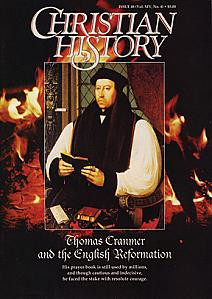Cranmer Insisted on Burning van Pare and Got Burned Himself
WHERE THERE IS A CHURCH established by the state, persecution of sects that hold views that differ from the official church often follows. The great reformers of the sixteenth century, including Luther, Zwingli, Calvin, Bucer, and Cranmer, were all guilty of executing or urging the execution of those who differed from them in religious views.
Only two such executions took place during the short reign of King Edward VI (1547-1553). In general, the English reformers were not bloodthirsty. However, they did not tolerate Anabaptists. Anabaptists, the ancestors of today’s Mennonites (among other groups) believed that only converts who confessed Christ when old enough to understand their action could properly be baptized. It was not for that viewpoint that Joan Bocher and George Van Pare were executed, however, but because of their teachings regarding Christ.
Joan Bocher, also known as Joan of Kent, had distributed copies of Tyndale’s New Testament when it was illegal to do so and had used her wealth to relieve prisoners of conscience. She also taught that the Virgin Mary had two seeds, one natural and one spiritual, and that Christ was the spiritual seed. When confronted about her unusual views, she stuck to them stubbornly and even impudently. Although she accepted Jesus as virgin-born and God-man, Cranmer, Ridley, and Coverdale condemned her to be burned to death as a blasphemer.
At first Edward refused to sign her death warrant. For a boy, he seems to have been far ahead of his adult advisors in wisdom on this issue. He said that to burn her was too much like the cruelty the same reformers condemned when it was done by Catholics. Cranmer argued with the king until he beat down his objections. With tears in his eyes, Edward finally signed, but warned Cranmer he was responsible if the deed should be wrong. Joan was burned in May 1550.
The second victim was a Dutch surgeon named George Van Pare. He was known for his strict and prayerful life. However, he was condemned because, in addition to his Anabaptist views on baptism, he seems to have denied the full divinity of Christ, saying only God the Father was God. Because he spoke no English, his trial was conducted through an interpreter. Cranmer condemned him on this day, 6 April 1551. Later that month Pare went to the stake: a historian wrote, “He suffered with great constancy of mind and kissed the stake and faggots that were to burn him.”
These were costly precedents. During the reign of Queen Mary, when Catholics burned Protestants in large numbers, they gave as their justification the executions of Bocher and Pare in addition to others that had taken place under King Henry VIII with Cranmer’s consent. When Cranmer himself was led to the stake, some people muttered that he only got what he deserved.
—Dan Graves
----- ----- -----
For more on the English Reformation see "The Accidental Revolution" in Christian History 118. For more on Cranmer, see Christian History 48 Thomas Cranmer and the English Reformation






